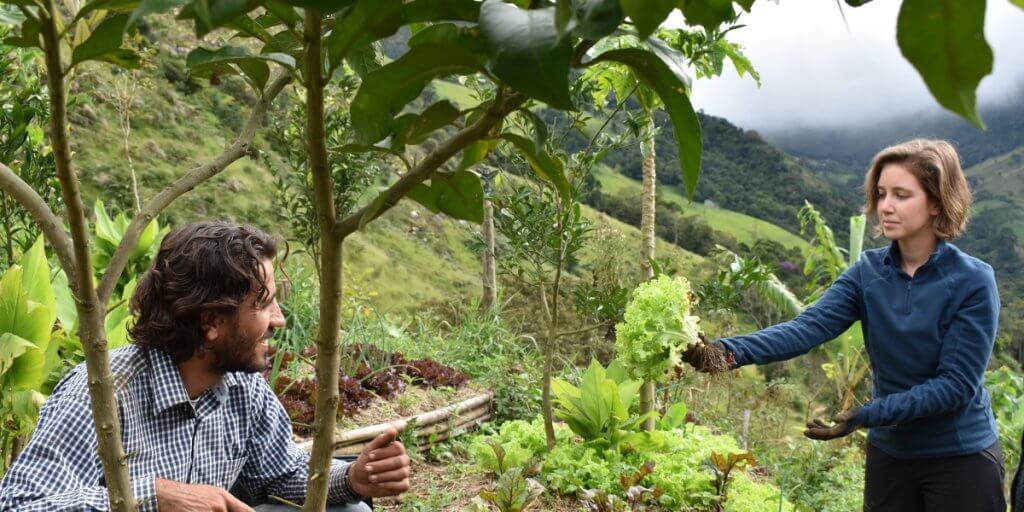![[:en]Sarita | Austrian shares her short-term volunteer experience on eco farm [:br]Sarita | Austríaca fala da sua experiência no voluntariado de curto prazo na fazenda ecológica[:sp]Sarita | Austríaca habla de su experiencia en el voluntariado de corto plazo en la hacienda ecológica[:] 5 sarita short ter volunteer experience ecocaminhos ecofarm agroforestry e1591961391835](https://ecocaminhos.com/wp-content/uploads/2020/06/sarita-short-ter-volunteer-experience-ecocaminhos-ecofarm-agroforestry-e1591961391835.jpg)
Eco Caminhos offers various programs for volunteers, including a short-term option. Sarita Schenkermayr, 29 years old, participated in this particular experience for 4 months. She recounts her routine and the good that the eco farm brought into her life:
“What I was looking for at the farm was primarily to experience the calm life on the brazilian countryside while learning about organic farming and eco construction, seeing more of Brazil, and to improve my portuguese.”
Sarita stayed at the eco farm from January to April of 2020 and reflects on her experience, including the challenges brought on by COVID-19:
“Cardinot is quite secluded, we were relatively safe and far away from corona hotspots, and furthermore we could still move freely around and explore the big farm area, enjoying nature. The mountains, forests and waterfalls form a little paradise on earth, with a surprisingly European climate, and I never got tired of spending my days outside.”
Sarita explains her routine on the farm and what can be learned and put into practice:
“Every week was a little bit different, but usually it was decided on Thursday morning, at the weekly reunion, which things were going to happen the following days and where everyone was going to work, which is highly dependent on the current demand.
The day starts early at the farm: At 7:00am sharp, everyone had to be ready to hop on the pick-up car that drove us up the hill to the eco construction site or garden and agroforest at Bart’s house. Before lunch at 12:00, there is a short coffee break at about 9:30, and the working day ends at about 16:00 or 16:30.
As a short-term volunteer I had Tuesdays and Thursdays off; and on the working days I was mostly helping in the garden or agroforestry, picking weeds, collecting and laying out organic matter for the vegetable beds and planting – all with hearing an explanation of how to do it and why, of course.
During my time in EcoCaminhos, the rough walls of the bioconstructed EcoLodge were finished and there were a few intensive weeks where almost everyone was working on that (adding bit by bit of the bio material to the top of the wall by hand). On very rainy days, it was tried to switch to more indoor-based work, when that alternative was possible, for example, finishing the inside-walls of the chicken coop. Many times, however, we had to continue in the rain as well, so I recommend purchasing a rain-coat and rubber boots in Nova Friburgo if you come during the rainy season.
Most people were scheduled to cook lunch for everyone as well, so one or sometimes two times a week, I used the hours before midday to cook (usually rice, beans, a salad and variating other side dishes), mostly together with another person.
Coming back to the volunteer houses in the late afternoon, everyone was free to do what he or she wanted. On Tuesdays there was the option to participate in the English classes, as well as the Portuguese lessons on Thursdays. Wednesday evenings, there were the volunteer nights, which consisted mostly of sitting around a bonfire eating food that some had prepared, but a few times we did play games and once we had a karaoke night. Sometimes over the weekend, we could borrow the projector to watch movies together.
The weekends are free as well, and for the volunteers there is usually some kind of activity planned. In the weeks I was there, for example, I visited a lot of waterfalls, went hiking, took a weekend trip to the beach some hours away, went to the local cheesery, visited a former coffee plantation, went horseback riding and to the city to eat açaí and Brazilian pizza.”
Sarita points out that she is happy with the experience she had at the eco farm:
“I am grateful and happy for my experience and am looking forward to seeing how that little permaculture farm, striving to be self-sustaining, will develop in the future.”
Discover volunteer opportunities and participate in our project!
![[:en]Eco Caminhos: Permaculture & Agroforestry Farm in Brazil[:br]Eco Caminhos: Fazenda de Permacultura e Agrofloresta no Brasil[:sp]Permacultura y Agroforestería en Brasil: Eco Caminhos[:]](https://ecocaminhos.com/wp-content/uploads/2024/02/Eco-Caminhos-logo-without-border.png)

 Português
Português Español
Español


![[:en]ECOLIBRIUM, LATEST NEWS FROM THE FARM[:br]ECOLIBRIUM, ÚLTIMAS NOTÍCIAS DA FAZENDA[:sp]ECOLIBRIUM, ÚLTIMAS NOTICIAS DE LA GRANJA[:] 12 Araca Project](https://ecocaminhos.com/wp-content/uploads/2026/02/WhatsApp-Image-2026-01-30-at-9.03.15-AM-1-500x344.jpeg)
![[:en]Highlights from November and December 2025[:br]Destaques de Novembro e Dezembro 2025[:sp]Resumen de Noviembre y Diciembre 2025[:] 13 voluntariado grego, bioconstrução, telhado verde, ecolibrium, intercâmbio jovem.](https://ecocaminhos.com/wp-content/uploads/2025/12/IMG-20251230-WA0040-1-500x344.jpg)
![[:en]October Highlights: Volunteering, Ecotourism, and Sustainable Projects[:br]Destaques de Outubro: Voluntariado, Ecoturismo e Projetos Sustentáveis[:sp]Lo Más Destacado de Octubre: Voluntariado, Ecoturismo y Proyectos Sostenibles[:] 14 20251025 141712 1](https://ecocaminhos.com/wp-content/uploads/2025/11/20251025_141712-1-500x344.jpg)